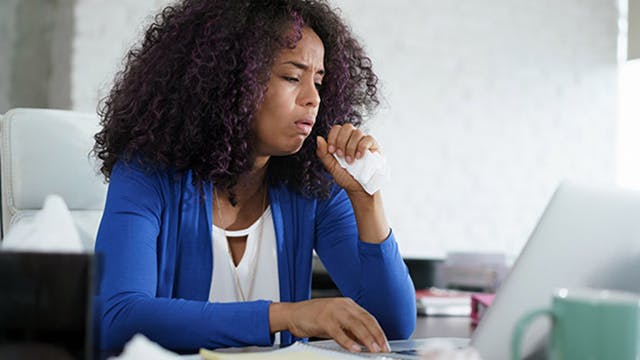1. Get the flu shot
The single most effective thing you can do to avoid the flu is to get vaccinated every year. Unfortunately there’s no vaccine to protect yourself from the common cold.1 Even so, you should still get the flu shot to protect yourself and others from the flu. The flu is a potentially serious disease that can lead to hospitalization in severe cases, and getting vaccinated every year can reduce the risk of flu illnesses and hospitalization.3 Although it’s not ideal to catch a cold, the common cold does not come with the risk of complications like the flu does and typically has milder symptoms.1
If you plan to get the flu shot, make a plan to get it before flu viruses start spreading in your community since it takes about two weeks for the antibodies to develop after the vaccination. Make plans to get vaccinated early in fall before flu season begins.3 Most doctor’s offices and clinics offer appointments to get the vaccine. Talk to your doctor about setting up an appointment or visit a nearby clinic to learn more.
2. Washing your hands thoroughly
The best way to avoid catching a cold or the flu is to wash your hands frequently with soap and warm water for at least 20 seconds.1 Scrubbing your hands with soap kills any germs that you may have come into contact with and helps minimize the chances of getting infected. It’s important to avoid touching your face before washing your hands in case there’s any harmful germs on them, but that’s easier said than done. An alcohol-based hand sanitizer will suffice if water and soap are currently unavailable.
3. Stay home
To avoid spreading colds and the flu, people should stay away from sick people and stay home if possible when sick.
Staying home when you’re sick can reduce the risk of the virus spreading to others. By limiting the spread of viruses, you can avoid spreading infections to people who are at risk for developing complications. The CDC recommends that people infected with the flu should stay home for at least 24 hours after their fever is gone unless there is an urgent reason to leave the house.4
4. Avoid sharing certain objects
Linens, eating utensils and dishes belonging to those who are sick should not be shared without washing thoroughly first. If possible, use disposable silverware or your own and avoid using anything that could potentially be infected. Any personal items that may have touched bodily fluids of someone infected should be avoided altogether.
5. Disinfect frequently
Frequently touched surfaces should be cleaned and disinfected at home, work and school, especially if someone is ill. Desks, chairs, remotes, and other commonly used objects should be wiped down with a disinfectant wipe or spray.
Although there’s no immediate cure for a cold or the flu, you can help relieve your symptoms with over-the-counter products like Theraflu for fast, powerful relief. If you have any remaining questions, please contact your healthcare provider.



